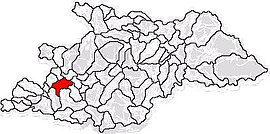Satulung (Hungarian: Kővárhosszúfalu; German: Langendorf) is a commune in Maramureș County, Romania. Its name, translated in English, means "the long village". It is composed of seven villages: Arieșu de Pădure (Erdőaranyos), Fersig (Fehérszék), Finteușu Mic (Kisfentős), Hideaga (Pusztahidegkút), Mogoșești (Magosfalu), Pribilești (Pribékfalva), and Satulung.
Satulung | |
|---|---|
 Teleki Castle in Satulung | |
 Location in Maramureș County | |
| Coordinates: 47°34′N 23°26′E / 47.567°N 23.433°E | |
| Country | Romania |
| County | Maramureș |
| Subdivisions | Arieșu de Pădure, Fersig, Finteușu Mic, Hideaga, Mogoșești, Pribilești, Satulung |
| Government | |
| • Mayor (2020–2024) | Bujorel-Vasile Mureșan[1] (CMM) |
Area | 68.50 km2 (26.45 sq mi) |
| Elevation | 165 m (541 ft) |
| Population (2021-12-01)[2] | 6,376 |
| • Density | 93/km2 (240/sq mi) |
| Time zone | EET/EEST (UTC+2/+3) |
| Postal code | 437270 |
| Area code | +40 x59 |
| Vehicle reg. | MM |
| Website | primariasatulung |
Geography
editThe commune belongs to the Baia Mare metropolitan area. It is located in the southwestern part of the Maramureș County, 17 km (11 mi) from the county seat, Baia Mare. The river Arieș flows through Arieșu de Pădure village.
The Fersig train station serves the CFR Main Line 400, which connects Brașov with Baia Mare and Satu Mare.
Demographics
editAt the 2021 census, the population of Satulung was 6,376, of which 67.14% were ethnic Romanians and 23.35% Roma.[3] At the 2011 census, the population of the commune was 5,837, more than at the previous census in 2002, when 5,409 inhabitants were registered.[4] The majority were ethnic Romanians (75.07%); the main minorities were the Roma people (19.86%) and the Hungarians (1.59%); for 3.41% of the population, ethnicity was not known.[5]
People
edit- Daniel Boldor, businessman from Baia Mare, was born in Fersig
- Blanka Teleki (1806–1862), who founded a school, was born in Satulung[6]
References
edit- ^ "Results of the 2020 local elections". Central Electoral Bureau. Retrieved 14 June 2021.
- ^ "Populaţia rezidentă după grupa de vârstă, pe județe și municipii, orașe, comune, la 1 decembrie 2021" (XLS). National Institute of Statistics.
- ^ "Populația rezidentă după grupa de vârstă, pe județe și municipii, orașe, comune, la 1 decembrie 2021" (in Romanian). INSSE. 31 May 2023.
- ^ "Recensământul Populației și al Locuințelor 2002 - populația unităților administrative pe etnii". Kulturális Innovációs Alapítvány (KIA.hu - Fundația Culturală pentru Inovație). Retrieved 2013-08-06.
- ^ Rezultatele finale ale Recensământului din 2011: "Tab13. Populaţia stabilă după religie – judeţe, municipii, oraşe, comune". Institutul Național de Statistică din România. July 2013. Retrieved 2013-08-05.
- ^ Teleki Blanka Archived 2016-02-04 at the Wayback Machine, Sulinet.hu, retrieved 18 July 2015

